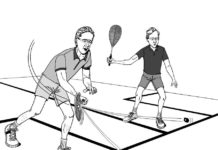By Barry Faguy, WSF Referees and Rules Committee
HEY REF! My opponent often has her father attending her games, and he’s always shouting advice to her from the benches. This is really irritating. Can I ask the ref to intervene?
You certainly may – but shouldn’t need to. It’s up to the Referee to take control of such situations and demand that the coaching stop simply because it’s not fair; the rules specifically forbid it. The ref can impose a penalty on the player being coached if certain that this is indeed the case. Of course, brief calls of encouragement such as “Good shot, Judy” are OK—unless of course the player’s name is Mary!!

HEY REF! Is it true that poor behavior has to be punished on a sliding scale—starting with a Warning, then a Stroke, a Game, & a Match?
That’s a myth—but sometimes a useful one. Many a player who has received a Conduct Warning has fallen into line, fearing that any subsequent misbehavior would mean an automatic Conduct Stroke. On the flip side, some have been surprised to find themselves hit with a Conduct Game right off the bat (say, for having destroyed their racquet on the wall in anger). The fact is that the rules allow a Referee the flexibility to start at any level of penalty for each category of poor behavior.
HEY REF! What happens if my opponent asks for a let because of interference before I’ve even finished my shot?
This generally happens with the ‘access’ type of interference, where the request is made before the ball has reached the front wall (the technical changeover point between striker & non-striker). Strictly speaking, your opponent is out of luck because a player must be the striker in order to request a let for interference. However, the “strictly speaking” part of what I just said is often ignored. This means that a referee will typically allow the appeal—given that we play in the real world where: (a) the changeover point is often fuzzy; and (b) the speed of play often makes it unfair to apply. With this in mind, the next edition of the rules (2014) will contain an exception that will allow such early appeals—but only for the above-mentioned ‘access’ interference.
HEY REF! Is it true that sometimes when a ball breaks, it’s possible that we might need to replay the rally previous to the one where we discovered it was broken?
That’s kinda rare—but true. The rule was included a long time ago to address the possibility that the ball might already be broken before the server starts the serve—and that maybe the last rally ended with a broken ball. (Not to be too cynical, but some players might knowingly serve with a broken ball so as not to have to replay the last rally which they’ve won.) There are two conditions for that exception to be applied: (a) the receiver must appeal before returning the serve, and (b) the Referee must be uncertain as to when it actually broke.
HEY REF! What happens if my opponent is say, totally out of the play, having fallen in a front corner after making a boast—and I come in and hit an easy cross-court winner—but then we discover that the ball is broken. Shouldn’t the ‘broken-ball’ rule (obligatory replay) not apply—meaning that I should be awarded the rally?
I’m afraid not. Even though it sounds unfair—the problem is that we cannot know for sure that the ball didn’t actually break elsewhere in that rally—which might have affected the outcome of that previous boast.
HEY REF! What exactly is the ‘minimal interference’ rule about—and where does it apply?
For a long time, many less-than-ethical players would look for any opportunity to stop play with an appeal—either because they were running out of gas, or because they just didn’t want to go for a tough return. While the opponent might be busting a gut scrambling through all-manner of interference trying to keep play continuous—this unfair partner would stop play at the slightest contact, claiming ‘interference’. The ‘minimal interference’ rule now obliges the Referee to decline a let where the ‘effect’ of the interference was judged to be insignificant. It’s all about ensuring fair play and reducing unnecessary interruptions.





